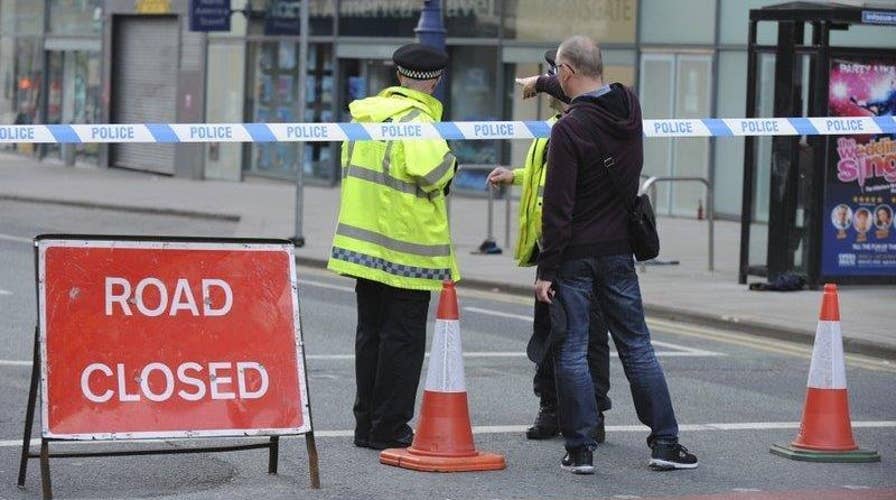Enough being done to prevent Manchester-style attack in US?
Debate and analysis on 'The Fox News Specialists'
British Prime Minister Theresa May will meet with President Trump on the sidelines of this week's NATO summit in Brussels to discuss a series of leaks related to the investigation into Monday's deadly terror attack in Manchester, England.
Multiple U.K. news outlets reported Wednesday that British officials were furious after the New York Times published forensic photographs of parts of the bomb that killed 22 people and injured 119 others outside an Ariana Grande concert at Manchester Arena.
Investigators worry that the leaks, which they believe to originate from the U.S. intelligence community, will complicate the probe into what they've described as a "network" surrounding suspected suicide bomber Salman Abedi. Greater Manchester Police said late Wednesday that six men and one woman had been arrested in a series of counterterror raids across Manchester's sprawling suburbs.
"We are furious. This is completely unacceptable," a Foreign Office source told the Press Association. "These images leaked from inside the U.S. system will be distressing for victims, their families and the wider public. The issue is being raised at every relevant level by the British authorities with their U.S. counterparts."
The leaks to American media began hours after the bombing, when multiple news outlets reported the suspect's name based on leaks from U.S. officials briefed by their British counterparts. Investigators did not name Abedi as the suspect until the day after the bombing.
Michael McCaul, R-Texas, the chairman of the House Homeland Security Committee, told Fox News Wednesday that he knew "firsthand that the Brits are not real happy" about the leak of the suspect's name.
"Once that name is released, then of course the others [connected to the bombing] will either do one of two things," McCaul told "The Story" host Martha MacCallum. "Go underground and hide, or try to get out of the country, or will detonate another explosive device very soon thereafter."
British Home Secretary Amber Rudd told Sky News earlier Wednesday that the leak of the suspect's name was "irritating" and said she had made clear to U.S. officials that it "should not happen again."
A national counter-terrorism policing spokesperson criticized the leak of the forensic pictures, saying that it "undermines our investigations and the confidence of victims, witnesses and their families.
"This damage is even greater when it involves unauthorized disclosure of potential evidence in the middle of a major counter-terrorism investigation."
European security officials have expressed concern about sharing intelligence with the U.S. after Trump discussed highly classified intelligence about ISIS with senior Russian officials visiting the White House.
Rep. Adam Schiff, D-Calif., the ranking member of the House intelligence committee, told reporters Wednesday he understands the concern about U.S. leaks possibly harming the U.K. police operation.
"If that's something that we did, I think that's a real problem," he said. "If we gave up information that has interfered in any way with their investigation because it tipped off people in Britain — perhaps associates of this person that we identified as the bomber — then that's a real problem and they have every right to be furious."
He said, however, that even if U.S. intelligence sources shared vital information with the media, it likely would not affect the strong intelligence sharing relationship between the U.S. and Britain because it helps both countries.
A European security official told the Associated Press that "having a U.S. leak when the situation has developed in the U.K. is nothing new.
"Historically, and nearly philosophically, the U.S. and U.K. intel services follow different paths," the official said on condition of anonymity because he wasn't authorized to speak about the investigation. "The U.S. have adopted a "zero risk" approach meaning that the U.S. services have a much shorter trigger when it comes to stop an ongoing operation. The U.K. services play it totally differently."
This was highlighted in the 2006 trans-Atlantic liquid bomb plot. Americans wanted to pounce to quickly stop the plot whereas British authorities were trying to better determine the suspects' capability and wider terror connections, according to two British officials who worked on the case at the time.
The Associated Press contributed to this report.

